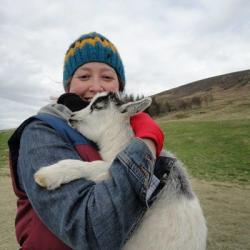The second annual Iceland Writers Retreat took place this past weekend, bringing together acclaimed authors from Canada, Iceland, Norway, the UK, the US, to share their craft with both local and international participants. I had the chance to sit in on two of the twenty writing workshops crammed into two days of the retreat—Ruth Reichl’s “Imaginary Meals: Writing Delicious Words” and Taiye Selasi’s “Hearing Voices.” Here’s a small sample of the tips and tricks that were discussed.
***

One of the qualities that the Iceland Writers Retreat prides itself on is its sense of intimacy and inclusiveness—world-famous authors, up-and-coming talents, and creative dabblers all sharing coffee, kleinur, and craft together in a relaxed and encouraging environment. And so it really shouldn’t surprise me to overhear renowned food writer, memoirist, and former New York and Los Angeles Times restaurant critic Ruth Reichl casually turn to a workshop participant and invite, “So, tell me about your restaurant.” But it does surprise me, and perhaps the recipient of her inquiry as well, since he doesn’t immediately respond with cunningly pat ‘elevator pitch,’ but rather an honest assessment of the challenges of running a sustainable restaurant in Appalachia.
To kick off her first workshop, Ruth begins by walking around the room and distributing a handful of fresh parsley to everyone, telling us that our first task is to write a description of the herb for someone who has never seen or tasted it. Five minutes later, we’re all reading our exercises aloud. Parsley’s curly leaves are likened to the ‘frilly-bum pants’ worn by little girls, its flavor to ‘a whole lot of nothing followed by a glass of water,’ its color to cartoon forests. There’s a description written as a first person memoir, as an encyclopedic entry, as a poem.
Approving murmurs from other participants accompany each reading—“Oh, that’s true,” “lovely”—and Ruth nods along, writing phrases and images she particularly likes from each piece on the white board. The more unusual, the more evocative, the better. Her first food reviews, she tells us, were actually written as short stories—“I’d write restaurant reviews set on Mars!”—something that helped her develop a unique approach to food writing, even if she eventually had to tailor it to meet the factual constraints of newspapers she worked for.
The key point, she says, is that “the best descriptions of taste are hardly ever about flavor. It’s about textures and feelings….The main problem with more pedestrian food writing is that people don’t want to go for the emotional.” Some of her favorite descriptions of food bear out this principal: Lawrence Durrell’s statement that black olives have “a taste as old as cold water,” or a recipe for date sauce and boiled beef in which Edouard de Pomiane calls for a a handful of parsley “the size of a bunch of violets.” Date sauce on boiled beef, Ruth notes, sounds distinctly unappetizing. But add the incongruity of a violet bouquet and you’ve suddenly got something a little more romantic.

Where Ruth’s workshop was in large part a meditation on description, Taiye Selasi’s “Hearing Voices” focused its attention on precisely that: the various perspectives and voices that can be used to tell a story. Cheerful and inviting and practically glittering with enthusiasm, Taiye jumped right in, asking each of us to write down a few personal facts about ourselves—our names, our hometowns, our mothers’ names—before redistributing our pages among the other participants having us all introduce “ourselves” in different voices.
“My name is Janine,” read the first man. “Our name is Sarah,” read the woman on his left. Her name is Kristín. Your name is John. “How did it feel to hear yourselves introduced by someone else?” Taiye asks, starting to break down the various implications that are carried by each voice. The isolation of hearing yourself described as “her,” versus the odd inclusivity of being referred to as a “we.” The sense of intimacy that can come from a first person narrative, juxtaposed with the tacit sense of accusation that might accompany a text that addresses the reader as “you.”
Using texts by Tope Folarin, Kafka, and herself (she laughs, amused at this), Taiye then has us practice writing in different voices. After each exercise, a few of us read aloud, each reader receiving a round of applause for their efforts. “I like my workshops to clap for each reader,” she smiles. “But even if you don’t, I will, all by myself.” She’s a disarmingly attentive listener, taking time after each reading to point out nice turns of phrase or something that really works in each piece.
Writers, of course, all approach craft in their own ways. Listening to Taiye, one gets the distinct impression that her own approach is one of earnest joy. Her enthusiasm is infectious and makes the whole plodding, painful writing process seem fresh and just plain fun. It’s precisely the jolt of energy that perhaps everyone who spends hours upon hours hunched over a computer, bogged down with the difficulty of conveying erudite themes or crafting elegant turns of phrase, needs every once in awhile.
Check out the Iceland Writers Retreat website for more on next year’s event.
Buy subscriptions, t-shirts and more from our shop right here!
















